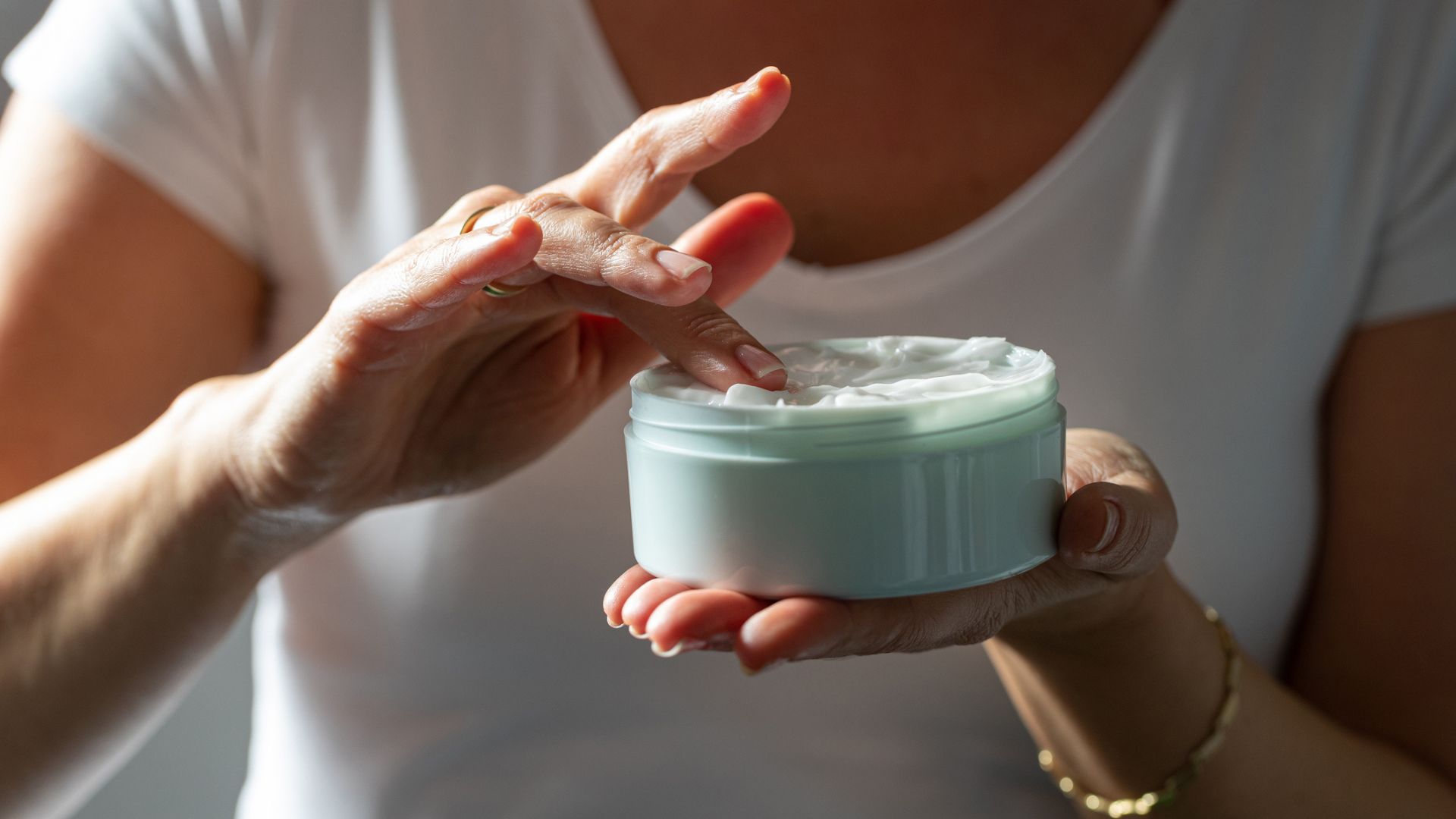What causes itchy skin? Doctors reveal the 9 common triggers - and when to worry about it
Itchy skin is a common problem with easy solutions, but you need to know what causes itchy skin before you can do something about it. Here, dermatologists reveal all


Distracting, irritating, and even painful - itchy skin can be a nightmare. Also known as pruritus, it's a condition that occurs when the skin barrier breaks down for several reasons and becomes more common with age.
The urge to scratch an itch comes when the nerve cells in the skin are stimulated. It can feel as severe as a minor electric shock or as distracting as an insect crawling across your skin, but the more often your nerve cells are stimulated, the itchier your skin will feel. Rough estimates suggest that we scratch an itch almost 100 times a day.
Itchy skin is mostly harmless though, caused by anything from the signs of high cortisol levels to dry skin, and so easily adapted to a new routine. Simple changes and you'll likely feel back to normal in no time. Only sometimes they are caused by factors that require medical attention, as the dermatologists we spoke to reveal.
What causes itchy skin?
1. Dry skin
The main cause of itchy skin is dryness. "Think of your skin as a barrier protecting you from the outside world," says Dr Kemi Fabusiwa, an NHS doctor and skincare expert, part of the Luna Daily Medical Collective. "When that wall gets dry and cracked, it allows the entry of irritants that can cause an itch. It means your skin reacts more readily to harsh soaps, fragranced products, or even temperature changes."
This can particularly be the case in drier weather conditions, such as the heat of the summer, or in the colder months where winter skin is often covered up and under-hydrated. Dry knuckles and hands, wrists, arms, face, and legs are particularly common.

NHS doctor and skincare lover, Dr Kemi became passionate about skin and body care in medical school. Ever since, she has been dedicated to helping people understand and take care of their skin better, alongside her busy hospital shifts and medicine exams. Dr Fabusiwa is also part of the Luna Daily Medical Collective.
2. Medication and supplements
Itchy skin is a side effect of some common medications - including painkillers like aspirin and blood pressure drugs.
Supplements - including excess B vitamins and beta-alanine, an amino acid often taken to help with muscle maintenance and fatigue reduction - are also known to cause itchiness.
Sign up to our free daily email for the latest royal and entertainment news, interesting opinion, expert advice on styling and beauty trends, and no-nonsense guides to the health and wellness questions you want answered.
While often harmless, it's worth visiting your doctor if you experience any side effects of prescribed medication or supplements.
3. Stress
There are causes of itchy skin that aren't linked to physical factors - and stress is one of them. One of the common symptoms of stress is skin issues, such as redness, inflammation and itching. When cortisol levels are higher than normal (or chronically high), it can interfere with the body's natural defence system and prevent the production of compounds that protect the skin.
With a damaged skin barrier, you're more likely to experience dryness, which could make your skin feel itchy. By learning how to lower cortisol levels, you can solve two problems at once: short-term stress and itchy skin.
4. Menopause
Dry skin is also one of the common symptoms of menopause as the hormone oestrogen, which helps keep the skin plump and hydrated, starts to decline in perimenopause.
"Oestrogen signals the production of natural oils and collagen (the protein that makes up our skin, hair, and nails) and declining levels lead to less oil production and lower collagen levels. Our collagen levels take a hit too, making our skin thinner. This drier, thinner skin gets easily irritated, leading to that itchiness," says Dr Fabusiwa.
5. Allergic reaction
Adding new products into your routine, such as cleansers, perfumes, and laundry detergents, can trigger allergic reactions you might not expect. "These allergens can trigger an immune response, resulting in itchy skin," says Dr Chandni Rajani, a GP and aesthetics specialist.
But more common allergies, such as hay fever, can be one of the common causes of itchy skin at certain times of year. "Tree pollen counts are highest between late March and mid-May, while grass and weed pollen counts are highest between mid-May and September," says Claire Nevinson, the superintendent pharmacist at Boots. This is when you're most likely to experience the allergy if you're prone to it.
There are many natural remedies for hay fever but to avoid the pollen dust affecting your skin, try to minimise direct skin contact with the air and wash your clothes when you come back into the house.
“Ensure windows in your car and house are closed to minimise pollen exposure on days when the count is high, dry your washing inside as grass pollen can easily get onto clothes, and if you have been outside, you should also change your clothes as soon as you come in," says Nevinson. "It's also best to shower and wash your hair as pollen is difficult to remove unless wet."

Dr Chandni Rajani is an advanced Aesthetic Doctor and GP with a special interest in women’s health. She has a wealth of experience in menstrual cycle disorders (e.g. irregular periods, period pain, heavy periods), reproductive health and contraception, menopause and fertility.
6. Vitamin A deficiency
You may be deficient in vitamin A if you don't eat lots of fish, organ meats like liver, dairy products, eggs, fruits and vegetables. "This vitamin is essential for maintaining skin cell differentiation, the process by which skin cells mature and function properly, so deficiency can lead to impaired skin barrier function and increases susceptibility to irritation, presenting as itchiness," says Dr Fabusiwa.
The vitamin also plays a key role in skin repair after injury, notes Dr Rajani, so if the skin around a recently healed wound is itchy, this could be why.
7. Vitamin D deficiency
Similarly, if you don't get enough vitamin D, you may find that your skin itches more than normal.
"Vitamin D also plays a vital role in regulating immune function and inflammation in the skin," says Dr Fabusiwa. "Studies have linked deficiencies to dermatological conditions like eczema, which can manifest with itching."
8. Vitamin E deficiency
Vitamin E has a dual impact on the body that makes deficiency a sure cause of itchy skin. "It's an antioxidant that protects the skin from damage," says Dr Rajani, helping to maintain healthy skin and eyes, and protect the immune system.
"Insufficient levels of these vitamins can compromise skin health, leading to dryness, irritation, and itching, so maintaining a balanced diet rich in essential nutrients is crucial for healthy skin and overall wellbeing," she says.
If you have any concerns about vitamin deficiencies, it's best to visit your doctor or another health professional and seek advice before taking supplements or changing your diet.
9. Eczema or Psoriasis
If dryness, redness, and cracking accompanies your itchy skin, you may be suffering from eczema. It's an inflammatory condition that occurs anywhere on the body, but many people find it manifests inside the elbows, behind the knees, and at the front of the neck.
Psoriasis is a very similar condition that leaves red, inflamed patches of skin covered with silvery scales on the body. It's also one of the common causes of hair loss in women.
"Eczema involves inflammation of the skin, leading to redness, swelling, and itching, while psoriasis leads to the rapid buildup of skin cells, resulting in dry, itchy patches," says Dr Rajani.
Both conditions can have a hereditary element, in that if someone in your family has eczema or psoriasis then you are more likely to develop it. It can also develop at certain stages of life - particularly between 50 and 60 years old.
Why is itchy skin worse at night?
Interestingly, it's very normal for skin to be itchier at night than in the daytime. This is down to two main reasons: 1. the body loses more moisture at night than it does in the day, contributing to drier skin, and 2. we produce higher levels of anti-inflammatory hormones like progesterone in the daytime, with levels dropping into the evening and nighttime.
Our body temperature also changes at nighttime and this can cause our skin to react, especially when sleeping in the heat of the summer.
When should I be worried about itchy skin?
Itchy skin isn't usually a sign of anything serious, notes Dr Fabusiwa. However, there are a few red flags to look out for. "If you experience any of these, it's always best to get checked out by a doctor to rule out underlying conditions," she says.
- If the itching is intense and unrelenting
- If you have a rash or bumps along with the itching
- If the itching is only in one specific area
"Itchiness that interferes with daily activities or disrupts sleep should also be addressed promptly," adds Dr Rajani.
This article is for general interest and is not intended to suggest a course of action that might be suitable for you. Always consult a licensed healthcare professional before making decisions concerning your health and wellbeing.

Grace Walsh is woman&home's Health Channel Editor, working across the areas of fitness, nutrition, sleep, mental health, relationships, and sex. She is also a qualified fitness instructor. In 2025, she will be taking on her third marathon in Brighton, completing her first ultra marathon, and qualifying as a certified personal trainer and nutrition coach.
A digital journalist with over seven years experience as a writer and editor for UK publications, Grace has covered (almost) everything in the world of health and wellbeing with bylines in Cosmopolitan, Red, The i Paper, GoodtoKnow, and more.